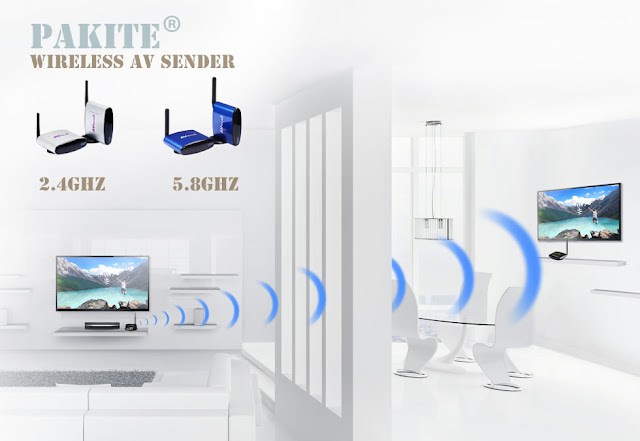PAT-260 - 2.4GHz Wireless Strong Penetration A/V Transmitter from PAKITE
PAKITE Wireless AV transmitter receiver is well knowed and professional. I had been using a 5.8 GHz audio/video system to transmit a video signal from my cable box(Converter Box) to a television one floor below. By placing the transmitter on the floor and the receiver near the ceiling below, I was able to get the units to within about a foot of one another, separated by the floor.
The system worked well until we moved the television to the floor above the Converter Box and, for practical and aesthetic reasons had to separate the link by about 25 to 30 feet with the floor in between. Unfortunately, in this new location, the signal became too weak to establish a wireless link so I decided to try this PAKITE PAT-260 system which is based on 2.4 GHz technology.
A 2.4 GHz signal can penetrate further into solid objects such as a wall or floor than a higher frequency 5.8 GHz signal. As a general rule of thumb, the higher the frequency, the better the video quality but the less penetration ability of the signal. So, if you have "line of sight" or LOS (i.e., no objects between the two units) at a reasonable distance then 5.8 GHz is the preferred system for acouple of reasons.
First, as noted previously, you can get a higher quality picture and, second, you can avoid interference from a range of devices(cordless phones, remote controls, wifi routers, etc.) in the crowded 2.4 GHz band. Of course, I don't have LOS and the increased distance between the transmitter and the receiver make 2.4 GHz my best option.
The system was easy to setup. It consists of two 4" X 3 1/2" unit seach of which has a 6" antenna and a power "cube" that is plugged into a wall outlet. One unit has "wireless transmitter" imprinted on the front, the other imprinted "wireless receiver". Of course, the transmitter is connected to the audio/video source while the receiver is connected to the television display. It comes with two, three-wire(red/white/yellow), audio/video connection cables with male "RCA jack" connectors. These are the cables where red and white are the two stereo audio channels and the yellow is the raw "composite" video signal. (Note: Since they both use the same round connectors, don't confuse the composite video output which carries the video signal on one cable with the red, green, blue "component" output swhich carry the three components of the video signal on three cables.)
Once set up you will need to make sure the transmitter and receiver are operating on the same channel by setting/matching a series of switches on the back of each unit. If you are getting wireless interference, then you will need to step through each channel (a total of eight channels) until you find a clear link. The link will work with any device that has a "composite" video(round yellow connector) and mono or stereo audio connections. So far it is working well for my application.
The PAT-260 av sender also supports a remote control extender which allows you to use an infrared remote to control the video source through the receiver box. Thiss ub-system uses a "reverse" link that transmits the remote signal through a separate wireless connection in which the receiver box "transmits" the remote signal to the transmitter box which then controls the video source. The system comes with an infrared transmission extension cable which is plugged into the transmitter and can be positioned infront of the IR detector on the video source.
I haven't set up this feature because we want to keep the remote control with the downstairs cable box and television. But, if needed, I would expect that we could buy a universal remote and set it up to run through the PAT-260 link.












